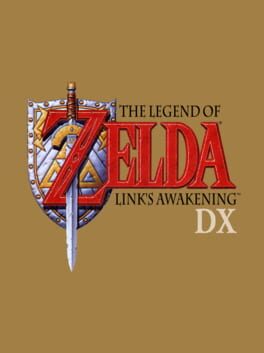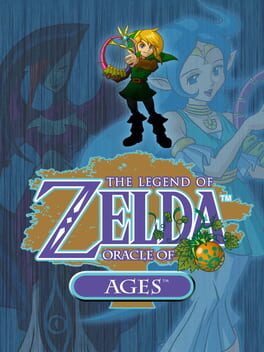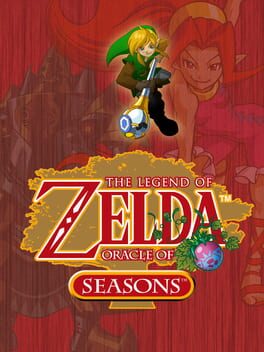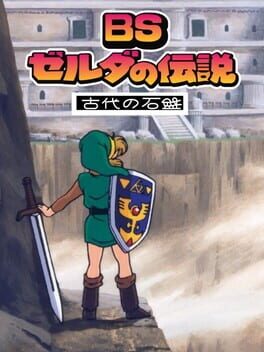

An expanded game of The Legend of Zelda: Link's Awakening
The Legend of Zelda: Link's Awakening DX is an updated re-release of Link's Awakening with several new additions, the most notable of which being the entire game is now in color.
Also in series
Reviews View More
This review contains spoilers
In 2019, back in those dreadful days when it was normal and expected of one to have a daily commute, I was playing Link's Awakening on my way home. Tired after a long day's work, I wasn't keen on making any significant progress, just wanted to look around. In the game's main hub town I've found Marin, who began to sing Ballad of the Windfish, a song I've heard a long-long time ago. I sat there, transfixed. I was in there, immersed if you will, a sensation the PS4 that waited for me at home sadly couldn't replicate with all of its hyper realistic graphics.
That's a cliche, I know, but I can't help being sentimental. I watched the little doggie hop about, the butterflies float about, the classic flowers bounce up and down, enjoyed my ability to move about without stopping the song, and goddamn. How did these wizards manage to squeeze this much life into a gameboy game?
After a bit, the magic was gone, I was staring at pixels and the sharp 8-bit sounds made my ears bleed, so I put the game away. But I was not the same after that. It was as if an alternate timeline, when I had Nintendos instead of (or alongside) Playstations as a child, converged with this one. I was, as Scallops Hotel once put it, nostalgic for something I never had.
Usually when someone, as kids today say, gasses a game from their childhood up, it's hard for others to get in on it, as those games tend to be enhanced by the vividness of a child's perception and imagination. I've been burned by Zeldas many times before on that front. Yet this game did it for me, first on an emotional level, and then on an intellectual one as well. It expresses childhood itself in a way only a videogame could.
At the end, after the player wakes the Windfish up, the entire game's world vanishes, being only said fish's (mammal's) dream. The bittersweet feeling one gets from it is analogous with that from growing up. Both things are something one has to willingly do, put effort towards. You don't wanna do it too fast, you want to cherish what you have and be in the moment, but you can't linger for too long. In a videogame, not making progress eventually makes the artifice obvious, breaks the magic of its presentation. In real life, staying an overdue kid is just not pretty. Look at Seth Rogen.
Even if it's gone, even if you can't go to places where you grew up or see people you remember, even if doing things that used to make you happy don't anymore, the initial experience of it all can still be found, deep within the folds of your soul. Summon it up every now and then, like a fleeting dream, to keep your feelings alive. After all, we live inside a dream.
That's a cliche, I know, but I can't help being sentimental. I watched the little doggie hop about, the butterflies float about, the classic flowers bounce up and down, enjoyed my ability to move about without stopping the song, and goddamn. How did these wizards manage to squeeze this much life into a gameboy game?
After a bit, the magic was gone, I was staring at pixels and the sharp 8-bit sounds made my ears bleed, so I put the game away. But I was not the same after that. It was as if an alternate timeline, when I had Nintendos instead of (or alongside) Playstations as a child, converged with this one. I was, as Scallops Hotel once put it, nostalgic for something I never had.
Usually when someone, as kids today say, gasses a game from their childhood up, it's hard for others to get in on it, as those games tend to be enhanced by the vividness of a child's perception and imagination. I've been burned by Zeldas many times before on that front. Yet this game did it for me, first on an emotional level, and then on an intellectual one as well. It expresses childhood itself in a way only a videogame could.
At the end, after the player wakes the Windfish up, the entire game's world vanishes, being only said fish's (mammal's) dream. The bittersweet feeling one gets from it is analogous with that from growing up. Both things are something one has to willingly do, put effort towards. You don't wanna do it too fast, you want to cherish what you have and be in the moment, but you can't linger for too long. In a videogame, not making progress eventually makes the artifice obvious, breaks the magic of its presentation. In real life, staying an overdue kid is just not pretty. Look at Seth Rogen.
Even if it's gone, even if you can't go to places where you grew up or see people you remember, even if doing things that used to make you happy don't anymore, the initial experience of it all can still be found, deep within the folds of your soul. Summon it up every now and then, like a fleeting dream, to keep your feelings alive. After all, we live inside a dream.
This review contains spoilers
A Zelda game inspired by Twin Peaks that has nothing to do with the other Zeldas: if only spin-offs of well-known series could have the quality of this game.
Originally conceived as an adaptation of A Link to the Past, the game became something entirely different. The transition from SNES to GameBoy at the time often meant a degradation of the original product due to the technical limitations of the device. I had been traumatized by the GB version of Donkey Kong Country. Here, with Zelda, it's completely different; we're not faced with a 'lite' version. Even though the world of Link's Awakening is smaller in size than A Link to the Past, I felt more like this game added elements rather than removing them. We have more cutscenes, memorable characters, and more music (which is incredible, by the way).
Certainly, we return to a linear gameplay pattern, but the game's progression is exceptional. It feels like each 'square' of the map is used optimally. The size of the world, in my opinion, is ideal: neither too big nor too small. With each new item, we enjoy revisiting this world to discover new secrets, whereas A Link to the Past with its two parallel worlds seemed too large and confusing to me. Is Link's Awakening easier? If compared to its predecessors, the answer is clearly yes.
Spoilers: After discovering that the island is just a dream, I was struck by the fact that we view the game in a more melancholic light. Perhaps it's a metaphor for the player, but finishing the game means the disappearance of Koholint. The ambivalence in which we find ourselves is truly unique. After reading the mural, we enter the sixth dungeon and this music plays on loop, which I find particularly sad: https://www.youtube.com/watch?v=4X6UqQDmjBk
It's the first Zelda game that I played and finished (thanks to a magazine) that I absolutely loved. Almost 25 years later, the experience is almost the same. I played it with a smile.
Originally conceived as an adaptation of A Link to the Past, the game became something entirely different. The transition from SNES to GameBoy at the time often meant a degradation of the original product due to the technical limitations of the device. I had been traumatized by the GB version of Donkey Kong Country. Here, with Zelda, it's completely different; we're not faced with a 'lite' version. Even though the world of Link's Awakening is smaller in size than A Link to the Past, I felt more like this game added elements rather than removing them. We have more cutscenes, memorable characters, and more music (which is incredible, by the way).
Certainly, we return to a linear gameplay pattern, but the game's progression is exceptional. It feels like each 'square' of the map is used optimally. The size of the world, in my opinion, is ideal: neither too big nor too small. With each new item, we enjoy revisiting this world to discover new secrets, whereas A Link to the Past with its two parallel worlds seemed too large and confusing to me. Is Link's Awakening easier? If compared to its predecessors, the answer is clearly yes.
Spoilers: After discovering that the island is just a dream, I was struck by the fact that we view the game in a more melancholic light. Perhaps it's a metaphor for the player, but finishing the game means the disappearance of Koholint. The ambivalence in which we find ourselves is truly unique. After reading the mural, we enter the sixth dungeon and this music plays on loop, which I find particularly sad: https://www.youtube.com/watch?v=4X6UqQDmjBk
It's the first Zelda game that I played and finished (thanks to a magazine) that I absolutely loved. Almost 25 years later, the experience is almost the same. I played it with a smile.
After my lukewarm enjoyment of A Link to the past, I was seriously doubting if I even liked 2D Zelda. Luckily, this game changed that.
Link's awakening is a true journey. The premise is captivating, the music is unique for most zones so you don't just hear the same 4 songs every time, and the enemies you face are weird and interesting. Dungeons, bosses and enemies are all excellently designed, but that goes without saying. I want to focus more on what makes Links awakening so unique. ...It's mostly the story. I love the story.
It struck all the right chords for me. While comparatively simple, heck, some may go as far as call it "cheap" (which I strongly disagree with), the story holds emotional weight in a way that no other Zelda game does. I don't want to spoil it just in case you don't know what's going on, but I knew the premise and the turning point in the plot still hit surprisingly hard. You can credit this to the incredible atmosphere and music. It's hard to describe why I liked it so much, maybe it's the characters and the focus on the little things. There's a few meaningful interactions with the NPCs and the camera feature helps highlight everything pleasant on your journey. I want everyone to experience the story even if they feel only a fraction of the enjoyment I did.
The one real shortcoming of this game is the item management, which can become clunky with only two buttons. You can blame gameboy limitations for the bulk of it, but lifting rocks should be a passive ability at the very least. My other issue is how cramped the world can feel. The lack of shortcuts and limited fast travel options make Koholint a bit of a hassle to explore if you want to go for the extras. My third issue is just a nitpick, really. Why does the tutorial pop up every time you find a piece of power or an acorn? I straight up ignored the power-ups so I wouldn't have to stay still for two seconds.
The DX port is the greatest way to experience Link's awakening if you don't want to go the full remake route. Highly recommended, this game made me a 2D Zelda fan
Link's awakening is a true journey. The premise is captivating, the music is unique for most zones so you don't just hear the same 4 songs every time, and the enemies you face are weird and interesting. Dungeons, bosses and enemies are all excellently designed, but that goes without saying. I want to focus more on what makes Links awakening so unique. ...It's mostly the story. I love the story.
It struck all the right chords for me. While comparatively simple, heck, some may go as far as call it "cheap" (which I strongly disagree with), the story holds emotional weight in a way that no other Zelda game does. I don't want to spoil it just in case you don't know what's going on, but I knew the premise and the turning point in the plot still hit surprisingly hard. You can credit this to the incredible atmosphere and music. It's hard to describe why I liked it so much, maybe it's the characters and the focus on the little things. There's a few meaningful interactions with the NPCs and the camera feature helps highlight everything pleasant on your journey. I want everyone to experience the story even if they feel only a fraction of the enjoyment I did.
The one real shortcoming of this game is the item management, which can become clunky with only two buttons. You can blame gameboy limitations for the bulk of it, but lifting rocks should be a passive ability at the very least. My other issue is how cramped the world can feel. The lack of shortcuts and limited fast travel options make Koholint a bit of a hassle to explore if you want to go for the extras. My third issue is just a nitpick, really. Why does the tutorial pop up every time you find a piece of power or an acorn? I straight up ignored the power-ups so I wouldn't have to stay still for two seconds.
The DX port is the greatest way to experience Link's awakening if you don't want to go the full remake route. Highly recommended, this game made me a 2D Zelda fan





